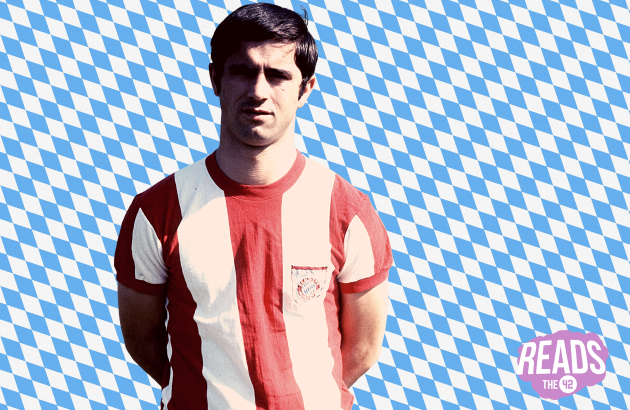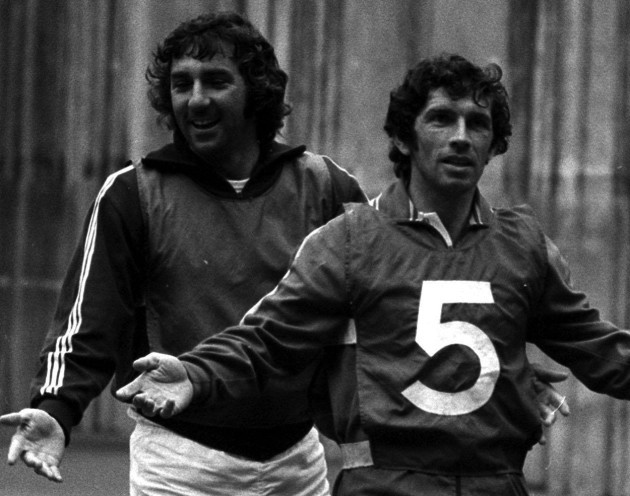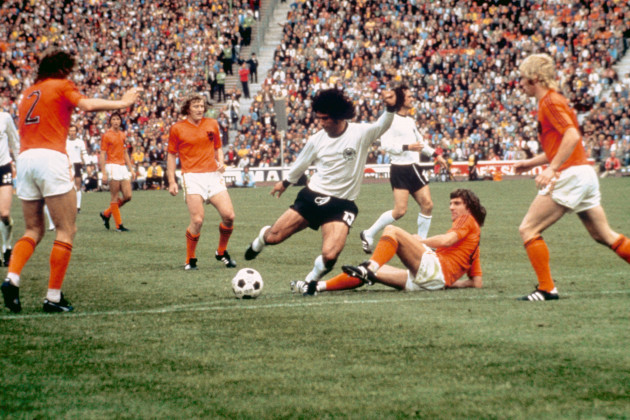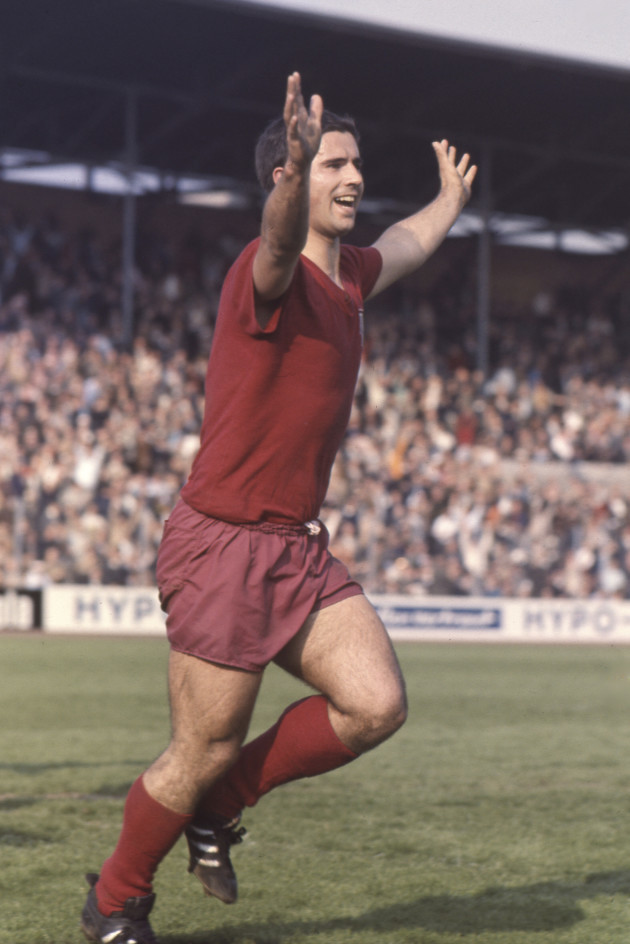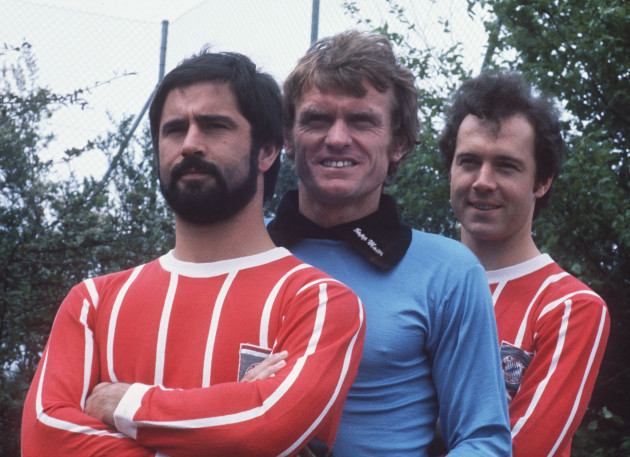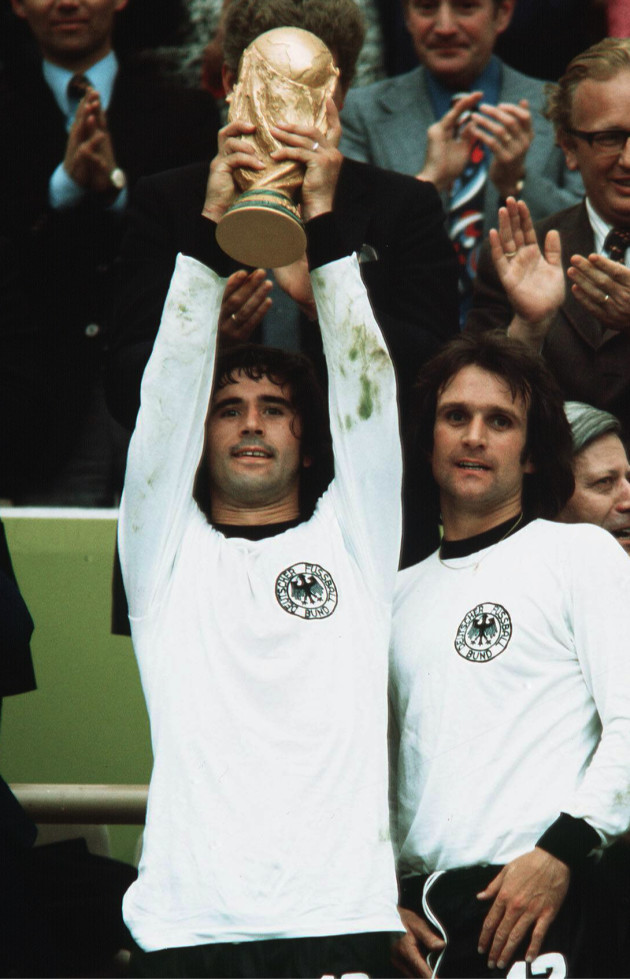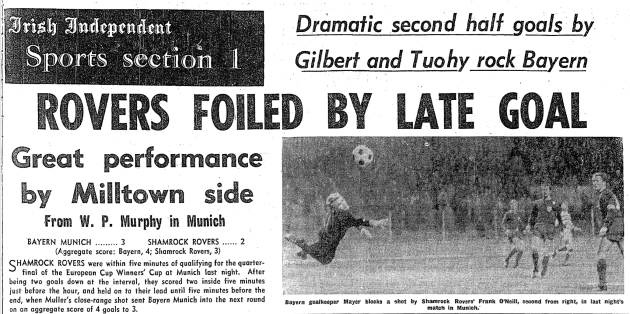THE RAIN WAS coming down hard as Paddy Mulligan left work at the Irish National Insurance Company and stepped out on to South Frederick Street.
It was 5pm on Wednesday 9 November 1966. The biggest test of his football career so far was only a few hours away, but the immediate priority was to negotiate the evening traffic and get home to Beaumont for his pre-match meal.
Awaiting Mulligan and his Shamrock Rovers team-mates was a Bayern Munich side backboned by players whose futures were to be shaped by the winning of a World Cup, as well as multiple Bundesliga and European Cup medals.
After fuelling up on tea and toast, Mulligan pointed his grey Austin A40 in the direction of Dalymount Park. All the while, the West German opponents were making their journey across town from their base at the Intercontinental Hotel.
Also en route was 16-year-old Eddie McGrath from Westland Row. The bus took him as far as O’Connell Street, where he joined the throng of fellow Rovers fans who were on the move towards Phibsborough to witness a game that they’d never forget.
“It was raining very heavily but the atmosphere was electric, as you can well imagine,” McGrath recalls. “What an incredible night it was. Unbelievable.”
- For more great storytelling and analysis from our award-winning journalists, join the club at The42 Membership today. Click here to find out more >
While acknowledging that their prospects of defying the odds in the European Cup Winners’ Cup second-round tie were slim, Rovers confronted it with cause for optimism.
In the previous season’s Fairs Cup (the precursor to the Uefa Cup and Europa League), Spanish side Real Zaragoza went all the way to the final, yet they needed a late goal from Brazil international striker Canario to dispose of the men from Milltown.
Furthermore, Rovers had just won a European tie for the first time in the club’s history. The meeting with Bayern Munich came as a reward for recording 4-1 victories – both at home and away – against Spora of Luxembourg.
Domestically, the Hoops were halfway through a remarkable run of six FAI Cup triumphs in a row. Under the guidance of former Newcastle United forward Liam Tuohy, who had a dual mandate as player and manager, the side contained six senior internationals and three others who would also collect Republic of Ireland caps later on.
Nevertheless, the achievements on the CVs of the Rovers players were modest in comparison to those boasted by a team of full-time professionals, who qualified by winning their main domestic cup competition, the DFB-Pokal.
“I always loved a challenge,” says Paddy Mulligan, “and the one Liam Tuohy gave me that night against Bayern Munich was probably the biggest challenge you could ever get.”
Mulligan had been tasked with a man-marking job on Franz Beckenbauer, who was returning to a ground where he played for West Germany only six months earlier.
In a warm-up game for the 1966 World Cup, Helmut Schön’s side eased to a 4-0 win at Dalymount Park against an Ireland team that featured Rovers trio Bobby Gilbert, Frank O’Neill and John Keogh.
West Germany suffered an extra-time defeat to England in the final at Wembley, but the World Cup provided Beckenbauer with a platform to establish himself as a global superstar.
From his central midfield role, the 20-year-old scored four goals at the tournament and he was recognised with the Best Young Player award following its conclusion.
“My idol was Frank O’Neill,” says McGrath, “so every time Frank got the ball against Bayern I was in my element. But you could tell right away that Beckenbauer was something special. Even though he was a young man, he was just majestic to watch.”
While the man known as Der Kaiser was credited with adding considerably to the attendance of 22,000 that saw Shamrock Rovers take on Bayern Munich, a player described by Beckenbauer as “the most important” in the Bavarian club’s history was also on the pitch that night.
A few days removed from his 21st birthday, Gerd Müller was only beginning to lay the foundations of a reputation as a striker who possessed unparalleled goalscoring prowess.
Bayern’s season was 14 games old by the time they arrived in Dublin, yet Müller had already scored 12 times – including a vital brace that saw off Tetran Presov of Czechoslovakia in the previous round of the Cup Winners’ Cup.
In 14 seasons, Müller would go on to set a record that’s still intact today, scoring 365 goals in 427 Bundesliga games for Bayern. The tally of 40 he accumulated during the 1971-72 campaign was only surpassed in May of this year by Robert Lewandowski.
Müller thrived for his country too. After netting in West Germany’s 3-0 win over the Soviet Union in the final of the 1972 European Championship, he grabbed a brilliant winner in the 1974 World Cup final against the Netherlands. The goal was one of 68 he scored while making 62 senior appearances at international level.
There’s an infinite ream of facts and figures that can be cited to emphasise the greatness of a man who sadly passed away earlier this month, aged 75.
In paying tribute to “the greatest striker there has ever been”, Bayern Munich president Herbert Hainer added: “Without Gerd Müller, FC Bayern would not be the club we all love today.”
Fresh from winning his first West Germany cap, Müller led the Bayern Munich attack against Shamrock Rovers. He hadn’t marked his recent international debut – a 2-0 win over Turkey in a friendly – with a goal, but he made up for it in his first competitive outing a few months later by scoring four in a 6-0 rout of Albania.
At the opposite end of the pitch for Bayern was Sepp Maier, who had just begun a 13-year stint as West Germany’s first-choice goalkeeper. The 22-year-old, who made his international bow at Dalymount Park earlier that year, was set for a much busier evening this time.
“We were just exalted to even be in the presence of these great players,” McGrath says. “As spectators we were in awe of them. It was a privilege just to be in the stadium that night at Dalymount.”
Prior to the first leg, Rovers boss Liam Tuohy told the press that his side would have to play “well above ourselves” to stand any chance of being competitive against the visitors, who were under the management of former Yugoslavia international Zlatko Čajkovski.
The gulf in quality between Bundesliga and League of Ireland football had been illustrated earlier that season, when Drumcondra were trounced 8-1 on aggregate by Eintracht Frankfurt.
Rovers supporters were beginning to fear that their team was set to suffer a similar fate when Bayern went ahead in the 17th minute. The hosts were unable to clear the danger from a corner, allowing Dieter Koulmann to fire the ball past Mick Smyth.
Müller almost doubled Bayern’s lead when Smyth pushed his header onto the crossbar, but he struggled otherwise to make an impact on a game that Rovers soon got to grips with.
“He got some slagging, I’ll tell you that for nothing,” Eddie McGrath says of Bayern’s young centre-forward. “The crowd knew that he was a danger man so he was ridiculed whenever things didn’t go right for him.
“He was going through at one stage and he meant to pass it but the ball went under his leg – you can imagine the reaction of all the kids, we were ecstatic that this potential superstar could miss the ball completely. Of course it was all jealousy, but there was quite a bit of jeering. It was that kind of atmosphere.”
Despite persistent Rovers pressure, Bayern were still in the ascendancy at half-time. However, the equaliser that seemed increasingly inevitable finally arrived just after the hour mark.
Billy Dixon, who provided the goal for Drumcondra in a 7-1 aggregate loss to Bayern in the Fairs Cup four years earlier, repeated the act as a Shamrock Rovers player. After Mick Kearin’s cross was knocked down by Tuohy, Dixon was on hand to poke the ball beyond Maier.
“The goal was no more than we deserved because we were surprisingly on top,” says Mulligan. “We played extremely well and we were a good team ourselves. The emphasis was on the team too, even though we did have some smashing individual players.
“Being part-timers who only trained twice a week, all of our lads would have been at work for the day before the game, whereas Bayern were relaxing at their hotel, having a sleep and a nice pre-match meal to prepare. I couldn’t even get out of work five minutes early!
“It just goes to show what you can achieve when you have the right spirit and mentality in your team. The skill has to be there first and foremost, but if the right attitude isn’t there as well then the skill won’t matter.”
McGrath adds: “The Rovers team in the 60s, they so often seemed to rise to the occasion when they needed to. Their self-belief was just astounding.”
Bayern were still on the ropes after the game had been levelled, but Rovers’ momentum was ultimately halted by the antics of a few of their own supporters.
The report carried in the following morning’s Cork Examiner noted that Sepp Maier’s “cocky play-acting did not endear him to the crowd”, which led to a few stones and bottles being hurled in the Bayern goalkeeper’s direction.
Under instruction from Dutch referee Laurens van Ravens, an announcement was made over the tannoy to warn Rovers fans that the game would be abandoned if the transgressions from the terraces continued.
“The play ended up being stopped for six or seven minutes,” says Mulligan. “That actually allowed Bayern to regain their composure and we weren’t able to exert the pressure on them again.
“I think we were actually taken off the pitch during the delay, so we went back to the dressing room. It was such a pity that the incident occurred because it wasn’t a dirty match or anything.
“Only the morons who threw the objects would have known why they did it. That kind of thing would have been sort of unheard of in League of Ireland football in those days.
“But that was that. A game we should have won ended in a 1-1 draw. It seems incredible to think that you’d be disappointed after drawing with Bayern Munich, but that was the reality of how it went. We felt we should have been taking a lead over there for the return leg.”
McGrath says: “I remember walking out of that stadium and being absolutely devastated. It was as if Rovers had been transformed. They always played good football anyway but they were stunning that night.
“Paddy Mulligan was outstanding. Beckenbauer was exceptional but Paddy hounded him and hounded him. He forced Beckenbauer back and the more he did, the wilder the crowd got.
“You just felt so proud that Rovers were the better team on the night against a club like Bayern Munich. In saying that, we still expected that it would be a mauling over in Munich.”
In his assessment of the contest, Irish Press journalist Tom O’Shea wrote: “The team that, on paper, stood no chance against the might of Bayern Munich had the huge crowd cheering wildly as they stormed to a magnificent draw. What really added all the more credit to this performance was the fact that this was a game Rovers could, and should, have won.”
Having drawn a blank in Dublin, normal service resumed for the prolific Gerd Müller when he returned to Bundesliga duty. Ahead of the arrival of Shamrock Rovers in Munich, Bayern posted a 2-1 victory over MSV Duisburg, with Müller scoring the winner.
“Ah, Gerd Müller – what a player he was,” says Mulligan. “He was just incredible, with such a quick footballing brain and a wonderful goalscoring instinct.
“He could smell goals. People used to say he was lazy but he was far from it. He just knew exactly when and when not to make the run, so he never wasted energy.
“We managed to keep him quiet at Dalymount Park, but doing it again in Munich a couple of weeks later was always going to be difficult. We were well aware of that.”
In order to follow how the second leg unfolded, Shamrock Rovers supporters like Eddie McGrath were dependent on the commentary provided for Radio Éireann by the late Philip Greene, an avid Rovers fan himself.
As Liam Tuohy’s team arrived at the Grünwalder Stadium ahead of kick-off, the broadcaster was on hand to jump to their defence when a local woman declared that she was a witch who had put a curse on Bayern’s opponents. Greene dismissed her by introducing himself as a warlock from Dublin who possessed vastly superior powers.
For Rovers, Bobby Gilbert’s recovery from injury in time for the second leg was significant, although that particular fillip was negated somewhat by the return to the Bayern team of another future World Cup winner, Hans-Georg Schwarzenbeck.
With only 13 minutes of the game played, it seemed like the witch’s hex was no hoax. In temperatures of minus nine degrees, the visitors were struggling on the icy surface and Bayern raced into a 2-0 lead through Dieter Brenninger and Rainer Ohlhauser.
Some defensive heroics ensured that the Hoops were no further behind by the interval, at which point a local journalist turned to his Irish counterparts in the press box and remarked: ”While Bayern are dancing a quickstep, Shamrock Rovers can only manage a slow foxtrot.”
Nothing about the first half hinted that the second might play out differently, yet a Bobby Gilbert effort that struck the Bayern crossbar shortly after the restart was a harbinger of what was to come from a rejuvenated Rovers side.
“Liam [Tuohy] just said, ‘lads, we’re not out of this game yet’ when we came in at half-time,” says Mulligan. “There was always great belief amongst ourselves. We went out in the second half with the mindset that we were going to go at them and give it a real go – and that’s what we did right from the start.
“All of a sudden, they were in a bit of shock and they started retreating, going into a defensive mode. At 2-0 down away from home, they didn’t expect us to keep going. A bit of arrogance came into play and they thought they were home and hosed.
“The pitch was very difficult – I don’t know how the game was played actually – but there was a steely determination in that Rovers team and we started winning our tackles. We refused to believe that we were beaten. We said we’d leave everything out on the pitch and we ended up playing extremely well in that second half.”
After hitting the frame of the goal moments earlier, Gilbert reduced the deficit – aided by a deflection off Beckenbauer – in the 55th minute when he was picked out by a Frank O’Neill cross.
Five minutes later, Sepp Maier was beaten again. With his wrist heavily strapped due to an injury sustained in a 2-1 win over Waterford United three days earlier, Tuohy was sent through on goal by Mick Kearin and the Rovers player-manager finished emphatically.
Numbering just over 11,000, the home fans in the ground had greeted the first Rovers goal with sympathetic applause. The second, which put the FAI Cup holders ahead via the away goals rule, sparked a chorus of jeers as they began to consider the unthinkable prospect of seeing their club eliminated by a team of part-timers.
Back in Westland Row, with the radio pressed to his ear, Eddie McGrath hung on every word being despatched from Munich by Philip Greene.
“I was living with my granny at the time because my mother had died, and I was listening to it in the parlour, as we called it,” he says. “There was just this lovely feeling as you started to believe that this miracle might really be about to happen.”
Given that Bayern were already budgeting for a place in the quarter-finals and the full house of 40,000 that was likely to accompany it, club president Wilhelm Neudecker “wiped beads of perspiration from his forehead with a handkerchief held in a shaking hand”, WP Murphy of the Irish Independent reported.
In their desperate pursuit of the goal that would turn the tie back in their favour, the hosts were running out of road. However, throughout his time with the club, Bayern would always carry the threat of an imminent goal once the ball was in Gerd Müller’s domain.
As Rovers were about to discover, the essence of the greatness of ‘Der Bomber’ was a predilection for being the most influential player in games during which he had largely been anonymous.
In the 86th minute, Beckenbauer took a quick free-kick and Müller was his target. The outcome was “a real hammer blow”, according to Paddy Mulligan.
“Müller made a run in between Ronnie Nolan and myself,” says Mulligan. “He hit it first-time and it flew into the roof of the net. It was an absolute nightmare for us but it was a moment of pure magic from him. It just summed up Gerd Müller completely.”
Müller’s goal was ultimately decisive, but the Rovers players felt that it shouldn’t have been allowed to stand, as Mick Kearin told The42 in a 2018 interview.
“They got a free-kick and the ball was rolling when Beckenbauer kicked it,” insisted Kearin. “It should have been retaken, and – bang! – [Müller] stuck it in the net. We should have won it. We were minutes away from history. It was a great Bayern Munich team, but by God, we frightened them, I’ll tell you that.”
While labelling Bayern “decidedly lucky” to have emerged from the tie, an evening newspaper in Munich lavished praise on Shamrock Rovers. Nevertheless, the narrative of a moral victory didn’t appeal to the Rovers players.
“We knew we had done well but we were hugely disappointed, massively so. It’s important to be clear about that,” Mulligan says. “We didn’t take that result lying down because we knew we had been so close to doing something remarkable.”
For Bayern, the campaign culminated in the clinching of the first European silverware in the club’s history. Müller contributed another winning goal in the quarter-final against Rapid Vienna. He then scored four in a 5-1 aggregate victory over Standard Liege, before the West Germans overcame Rangers in the final thanks to an extra-time strike by Franz Roth.
In 1974, when Bayern won the first of three consecutive European Cups, they did so with a team containing five members of the side that had come so close to being the victims of a monumental upset at the hands of Paddy Mulligan and his Shamrock Rovers team-mates.
Indeed, by heading in an Eamon Dunphy cross in a 2-1 defeat to a side that featured the likes of Müller and Beckenbauer, Mulligan would score his only goal for Ireland in a 1970 friendly against West Germany in Berlin.
He collected 50 senior caps and a Cup Winners’ Cup medal of his own by playing in Chelsea’s 1971 triumph over Real Madrid, yet more than half a century later, dust hasn’t been allowed to gather on the memories of the meeting with Bayern.
“I’ve never forgotten those games against Bayern Munich and I know that my colleagues from Shamrock Rovers haven’t either,” says Mulligan, who turned 76 this year. “Whenever I get together with people like John Keogh, Mick Lawlor, Frank O’Neill and Mick Kearin, Bayern always comes up in conversation.
“And even though he put us on the wrong end of the scoreline and caused us massive disappointment, it was still an enormous pleasure to play against Gerd Müller because he was a special, special player. To play against him and then watch him for many years after that, it was truly an honour.”
In memory of Gerd Müller (3 November 1945 – 15 August 2021), RIP.
For more great storytelling and analysis from our award-winning journalists, join the club at The42 Membership today. Click here to find out more >

